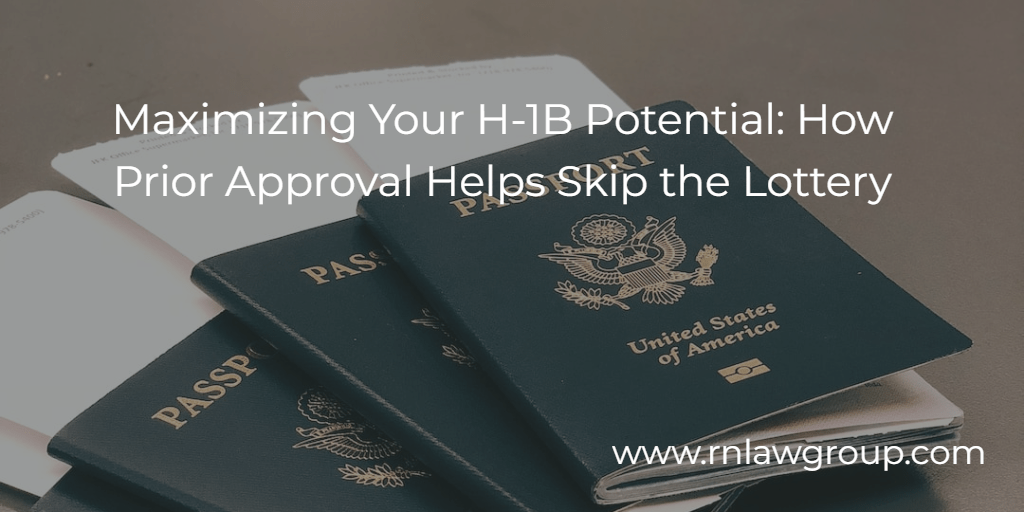
Maximizing Your H-1B Potential: How Prior Approval Helps Skip the Lottery
In today’s competitive job market, navigating the complexities of the H-1B visa process can be a daunting task, especially when it comes to understanding the intricacies of the H-1B cap and lottery system. For many aspiring professionals and previous H-1B approval holders, the uncertainty of being selected in the H-1B lottery looms as a significant hurdle. The good news is that individuals with a previous H-1B approval may have a straightforward path ahead. In some cases, they are exempt from the cap, meaning they can bypass the lottery process entirely. This exemption not only simplifies their journey towards working in the United States but also provides a more predictable and less stressful experience in securing their H-1B status.
What is the H-1B Cap?
The H-1B Cap refers to the annual limit set by the United States Congress on the number of new H-1B visas that can be issued each fiscal year. This cap is currently set at 85,000 visas, with 65,000 visas available for applicants holding a bachelor’s degree or equivalent, and an additional 20,000 visas for those with a master’s degree or higher from a U.S. institution. The H-1B visa program is designed for foreign workers in specialty occupations that require theoretical or technical expertise, and the cap is a mechanism to regulate the number of foreign professionals entering the U.S. workforce each year.
Understanding the Current H-1B Visa Lottery Process: A 2024 Overview
The H-1B visa lottery process is a crucial mechanism used to allocate H-1B visas fairly when the number of applicants exceeds the annual cap. Currently, employers submit registrations for prospective employees during a specified period, typically in early spring. Each registration requires basic information about the company and the prospective employee. If the total number of registrations surpasses the cap limit of 85,000 visas (65,000 under the regular cap and an additional 20,000 for those with advanced degrees from U.S. institutions), a random lottery is conducted. This lottery selects the registrations that will be considered for petition approval. Selected applicants are then invited to submit full H-1B visa petitions. The lottery process aims to streamline the application procedure and manage the high demand for H-1B visas in an equitable manner. Unfortunately, despite its intentions for fairness, the current H-1B lottery system often places applicants in a position of uncertainty, leading to a stressful and unpredictable experience as they await the outcome of their application.
Understanding H-1B Lottery Exemptions: Do Previous Winners Need to Reapply?
In the realm of U.S. immigration law, one of the key regulations governing the H-1B visa process is outlined in 8 CFR 214.2(h)(8)(ii)(A). This regulation stipulates that each individual who has been issued an H-1B visa, or has otherwise been granted H-1B nonimmigrant status, is counted against the applicable numerical cap (unless their petition was filed by a cap-exempt institution). Crucially, for those who have previously been selected in the H-1B lottery and received petition approval, this alone may not suffice to be considered ‘counted’ in the cap for the purpose of avoiding the lottery in subsequent applications. To meet the ‘counted’ criteria fully, an individual must have not only been selected in a previous year’s lottery and received petition approval, but they must also have either obtained the H-1B visa stamp at a U.S. consulate or embassy if they were outside the United States at the time of approval, or have been granted a change of status if they were already in the United States (meaning the approval came with a new I-94 card at the bottom).
How to Benefit from Previous H-1B Cap Approvals in Subsequent Applications
For individuals who meet the aforementioned criteria and are currently outside the United States, a specific process must be followed to utilize their prior H-1B cap approval. In this scenario, a U.S. employer is required to file a new H-1B petition on behalf of the individual. This petition should be submitted with a request for consular processing. Importantly, on the H-1B Data Collection and Filing Fee Exemption Supplement form, the employer must select the option indicating “cap exempt.” This selection corresponds to the situation where “The beneficiary of this petition has been counted against the cap and (1) is applying for the remaining portion of the 6-year period of admission.” To strengthen the application, it is crucial to include a copy of the prior H-1B petition approval. If this approval had previously granted a change of status, the submission should include the corresponding I-94 form. Alternatively, if the prior approval was for consular processing, a copy of the H-1B visa stamp should be provided. This documentation is essential to demonstrate the beneficiary’s eligibility for the cap exemption and to facilitate the process of obtaining an H-1B visa to reenter the United States.
For individuals in the United States under a different nonimmigrant status who are eligible to use a prior H-1B cap approval, a different filing procedure applies. In this scenario, the U.S. employer must file a new H-1B petition for the individual, but can request a change of status instead of consular processing. On the H-1B Data Collection and Filing Fee Exemption Supplement form, the application should be marked as “cap exempt,” indicating that the beneficiary has already been counted against the cap and is applying to utilize the remainder of their 6-year admission period. Crucially, the petition must be accompanied by evidence that the applicant is maintaining their current nonimmigrant status. This includes approval notices and the current I-94 record. Additionally, documentation related to the prior H-1B approval is required. As above, if the prior approval had granted a change of status, the submission should include the corresponding I-94 form. Alternatively, if the prior approval was for consular processing, a copy of the H-1B visa stamp should be provided. These documents are essential to demonstrate the beneficiary’s continuous lawful status in the U.S. and to support their eligibility for a change of status under the H-1B visa program without going through the lottery again.
H-1B Application Timing: Debunking the Myths of Deadlines and Validity
One of the key aspects of applying for this type of cap-exempt H-1B petition is the flexibility in timing. Unlike other visa processes, there is no strict time limit for filing this type of petition. Applicants are not bound to file it within the validity period of their previously approved petition, distinguishing it from an H-1B transfer, which typically requires adherence to specific validity dates. Furthermore, the application for this type of cap-exempt petition is not constrained by the standard 6-year limit on H-1B status. This means that even if several years have elapsed since the initial approval, individuals can still file for a cap-exempt H-1B petition. This flexibility provides a significant advantage to beneficiaries who have previously been counted under the H-1B cap, allowing them to apply for a new H-1B visa without the pressure of time-related restrictions commonly associated with other visa categories.
Clarifying Cap-Exempt H-1B Categories: Differentiating from Extensions, Changes in Employment, and Concurrent Positions
Navigating the landscape of H-1B visas reveals a complex array of filing categories, especially when it comes to cap-exempt petitions. It’s essential to understand that filing a cap-exempt petition based on a prior H-1B cap approval is distinct from other types of H-1B filings. Common H-1B petitions often include requests to extend the duration a current H-1B worker may remain in the U.S., to change the terms of employment for existing H-1B workers, to enable H-1B workers to switch employers, or to allow them to hold concurrent H-1B positions. Additionally, there are petitions filed by employers who are inherently cap-exempt, such as educational institutions or non-profit organizations. However, a cap-exempt petition based on previous H-1B cap approval stands apart from these scenarios. It caters specifically to those who have been previously counted under the H-1B cap and are looking to leverage this past approval This differentiation is crucial for applicants and employers to recognize when planning their H-1B visa strategy.
Conclusion
In conclusion, the H-1B visa process, particularly regarding cap-exempt petitions based on prior approvals, represents a complex but navigable landscape. This article, “Maximizing Your H-1B Potential: How Prior Approval Helps Skip the Lottery,” has endeavored to demystify the nuances and provide clarity on how previous approvals can be effectively leveraged. Whether it’s understanding the H-1B cap, navigating the lottery system, differentiating between various cap-exempt categories, or appreciating the flexibility in application timing, this knowledge is vital. With a deep understanding of H-1B visa regulations, we are committed to guiding professionals and employers through these intricacies. Our goal is to simplify what can be an overwhelming process and to offer strategic insights that can turn the unpredictability of H-1B visa applications into a structured, well-informed pathway to success.
By: Emily Neumann
Emily Neumann is Managing Partner at Reddy Neumann Brown PC with over 15 years of experience practicing US immigration law providing services to U.S. businesses and multinational corporations. Emily has helped transform the firm from a solo practice to Houston’s largest immigration law firm focused exclusively on U.S. employment-based immigration. She received her Bachelor’s degree in Biology from Central Michigan University and her Juris Doctorate degree from the University of Houston Law Center. Emily is a frequent speaker and has been quoted in Bloomberg Law, U.S. News & World Report, Inside Higher Ed, and The Times of India on various hot topics in immigration. She is a member of the American Immigration Lawyers Association and Society for Human Resource Management.
Reddy & Neumann has been serving the business community for over 25 years and is Houston’s largest immigration law firm focused solely on US. Employment-based immigration. We work with both employers and their employees, helping them navigate the immigration process quickly and cost-effectively.

